【重磅】高中英语unit2 语法学案
人教版高中英语必修2 Unit2 Grammar 优秀学案
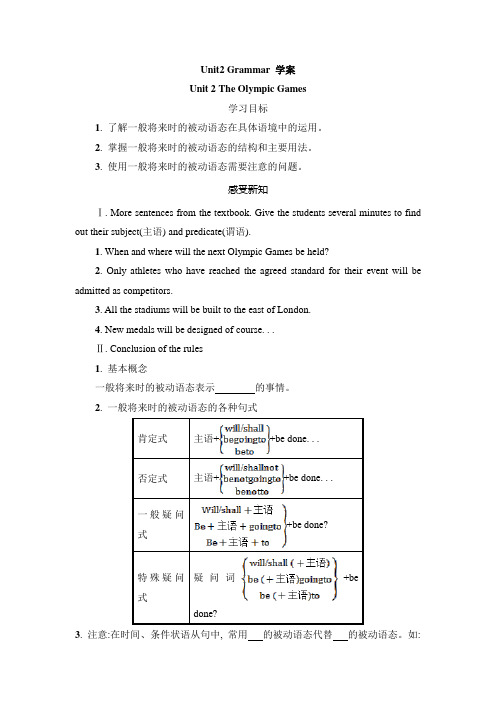
Unit2 Grammar 学案Unit 2The Olympic Games学习目标1. 了解一般将来时的被动语态在具体语境中的运用。
2. 掌握一般将来时的被动语态的结构和主要用法。
3. 使用一般将来时的被动语态需要注意的问题。
感受新知Ⅰ. More sentences from the textbook. Give the students several minutes to find out their subject(主语) and predicate(谓语).1. When and where will the next Olympic Games be held?2. Only athletes who have reached the agreed standard for their event will be admitted as competitors.3. All the stadiums will be built to the east of London.4. New medals will be designed of course. . .Ⅱ. Conclusion of the rules1. 基本概念一般将来时的被动语态表示的事情。
2. 一般将来时的被动语态的各种句式++be done. . .++be done?3. 注意:在时间、条件状语从句中, 常用的被动语态代替的被动语态。
如:When the dam is completed, the river will be controlled.大坝竣工后, 这条河的河水将得到控制。
Ⅲ. Consolidation1. Fill in the blanks with the right form of the given words.(1)We (not punish) if we break the rule.(2)The exam (not put off).(3)His new novel (publish) next week.(4)The sports meet (hold) on April 10th.(5)The problem (discuss)at tomorrow’s meeting.2. Translate the sentences into English.(1)这些旧建筑什么时候被拆除?(2)我不会因为自己的错误而受到父亲的惩罚。
人教课标版高一英语必修2Unit2语法导学案
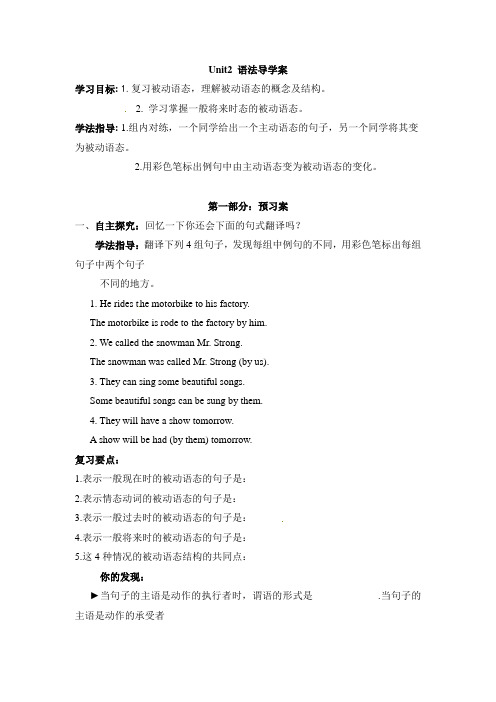
Unit2语法导学案学习目标: 1.复习被动语态,理解被动语态的概念及结构。
2. 学习掌握一般将来时态的被动语态。
学法指导: 1.组内对练,一个同学给出一个主动语态的句子,另一个同学将其变为被动语态。
2.用彩色笔标出例句中由主动语态变为被动语态的变化。
第一部分:预习案一、自主探究:回忆一下你还会下面的句式翻译吗?学法指导:翻译下列4组句子,发现每组中例句的不同,用彩色笔标出每组句子中两个句子不同的地方。
1. He rides the motorbike to his factory.The motorbike is rode to the factory by him.2. We called the snowman Mr. Strong.The snowman was called Mr. Strong (by us).3. They can sing some beautiful songs.Some beautiful songs can be sung by them.4. They will have a show tomorrow.A show will be had (by them) tomorrow.复习要点:1.表示一般现在时的被动语态的句子是:________________________2.表示情态动词的被动语态的句子是:__________________________3.表示一般过去时的被动语态的句子是:________________________4.表示一般将来时的被动语态的句子是:________________________5.这4种情况的被动语态结构的共同点:________________________你的发现:►当句子的主语是动作的执行者时,谓语的形式是_____________.当句子的主语是动作的承受者时,谓语要用____________。
高中英语人教新课标必修二unit 2(2)Grammar学案设计
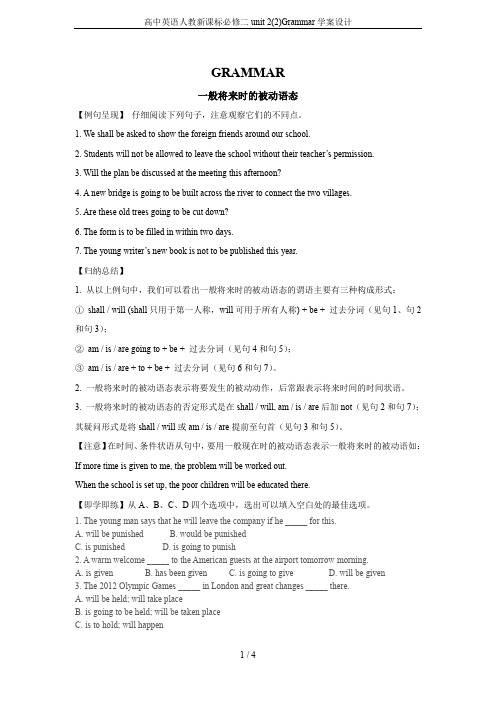
GRAMMAR一般将来时的被动语态【例句呈现】仔细阅读下列句子,注意观察它们的不同点。
1. We shall be asked to show the foreign friends around our school.2. Students will not be allowed to leave the school without their teacher’s permission.3. Will the plan be discussed at the meeting this afternoon?4. A new bridge is going to be built across the river to connect the two villages.5. Are these old trees going to be cut down?6. The form is to be filled in within two days.7. The young writer’s new book is not to be published this year.【归纳总结】1. 从以上例句中,我们可以看出一般将来时的被动语态的谓语主要有三种构成形式:①shall / will (shall只用于第一人称,will可用于所有人称) + be + 过去分词(见句1、句2和句3);②am / is / are going to + be + 过去分词(见句4和句5);③am / is / are + to + be + 过去分词(见句6和句7)。
2. 一般将来时的被动语态表示将要发生的被动动作,后常跟表示将来时间的时间状语。
3. 一般将来时的被动语态的否定形式是在shall / will, am / is / are后加not(见句2和句7);其疑问形式是将shall / will或am / is / are提前至句首(见句3和句5)。
人教版高中英语必修四unit 2语法导学案

人教版高中英语必修四Unit 2 Working the land(Grammar part)Today I’m doing to sharing my grammar lesson of Unit 2 Working on the Land which is taken from NEW SENIOR ENGLISH FOR CHINA STUDENT’S BOOK 4. I will say the lesson from the following ten parts.Part One: The Analysis of the Teaching MaterialsIn this class, we are going to learn the grammar part. First, I will analyze the whole unit. This unit is from Senior Book 4. The topic of this unit is working on the land about agriculture. The reading passage is about a well-known person-Yuan Longping that all the students have an expression on him. By learning this passage, not only do students broaden their horizon on agriculture development, but also they could understand the importance of saving .Then I am going to analyze the grammar part of the unit. This grammar of this unit is v.+ing form as subject and object. Before this unit, students have known what are subject, object and gerund. So I think it’s easy for students to learn it. The teacher still needs to give students good guidance about the grammar. The teacher should lead the students to discovery the rules of v.+ing form as subject and object step by step. The most important is to guide students to use v.+ing form as subject and object to express their own ideas.Part Two: Analysis of the students:The students in this grade have known some basic knowledge about what are subject, object and gerund. But grammar parts always are difficult for students. And the students think it’s so boring that they don’t pay much attention to it.At that time, teachers should arouse student’s interest at first. Teacher can use some vivid pictures, videos, and daily life experiences to help their teaching process. What’s more, students can learn the grammar rules by themselves and use it in daily life properly.Through the teaching process, students can change their fear about grammar. At the same time, students will get confidence and achievement.Part Three: Objectives:Ⅰ.Knowledge objectives(1)By the end of this stage,Ss are able to recognize v.+ing form as the subject and object.(2)By the end of this stage, Ss will master the rules of v.+ing form as the subject and object.(3)By the end of this stage, Ss should know how to use v.+ing form as the subject and object in their daily lives.(4)By the end of this stage, Ss are able to sort verbs gerund used as subject or object.Ⅱ.Language skills objectives(1) By the end of this stage, the students’ grammar sense and communicate abilitycan be developed. Students use English thinking to get, deal with and analyze information.(2)By the end of this stage, students are able to use the grammar to describethemselves and other students.Ⅲ.Education objectives(1)By the end of this stage, students learn to pay attention to others.(2)By the end of this stage, Students should care each other. Their confidenceand achievements of English are improved.Part Four: Focal points & Difficult pointsFocal points:Although Ss have known some grammar rules about this unit, they still need some opportunities to practice, to express their ideas, feelings and experience. And especially in grammar lesson, Ss firstly need to learn and master some important words and phrases in reading part. And then students are able to use v.+ing as subjectand object freely.Difficult points:As the senior high school students, they might not know how to get the key point of the grammar rules. Besides, students may have difficult in understanding of sentence structures.So I will use diagram to give Ss a direct understanding of the grammar rules. What’s more, more pictures and practices will be used.Part Five: Teaching methodIn my class, first I will use guided discovery method to guide students learning grammar rules. In this method, I present a contextual specific structure and write the whole sentences on the blackboard. Then I will use meaningful practice to enhance their ability to using v.+ing as subject and object. I provide students a context to use the grammar. At last, I will use audio--visual approach, using some pictures to arouse students’ interests and make class interesting.Part Six: Teaching principles:I think as a teacher, I should review the knowledge that students have learnt, such as key word and phrases in the reading part. While I have class, I will also use live show and pictures to arouse students’interests and provide students with some efficient strategies to improve students’ grammar sense step by step. As we all know, students are different in personalities and levels and other aspects, so I will consider those differences and try my best to make all the students participate in my class.Part Seven: Teaching Procedure1. PresentationStep 1: leading inI will introduce myself at first.That is“1. I’d like to begin my class with introducing myself.2.Teaching is my career, my job. 3. I devote most of my time to doing my job well. 4. I enjoy playing with friends. 5. I’m good at telling stories to myyounger brother. 6. I hate singing to him. Why? 7. My always forgetting words makes him very laugh.”Purpose: 1. This step make a close contact between teacher and students. It’s a good chance for teacher to show himself.2. Review the key words and phrases in reading part. Such as devote … to, would rather, lead a … life.3. Introducing v.+ing as subject and object in the beginning will give students a sign of focal points of the class.4. Give some verbs forward I enjoy… , I’m good at…,I hate…, I can’t stand. It’s easy for the students going to next teaching parts naturally.Step 2: Fill in blanksStudents read the passage then fill in the blanks. At last listen to the tape to check the answer. Wang Ping was a teacher in an agricultural college. She was not _____ ______ the present grain output in China. In her opinion, using organic farming methods was better for the soil than chemical fertilizer(化肥). Wishing for things costs nothing. She realized that Chinese farmers ______ _______ use methods they understood and _____ a comfortable ______. She, herself, cared more about ______ China______ the grain with a low output. So she started building her own organic farm and devoted herself to finding _____ ways to increase the grain output.______ ______ her hard work, her struggle for a higher output succeeded. Getting ______ when she worked in the sun meant nothing to her. Getting rid of ______ was what she really dreamed of.Purpose: This activity will not only practice students listening, but also give students a chance to discovery the grammar.Step 3: Summarize the grammar rulesFind and underline the sentence in the reading passage that use v.+ing as either subject and object. Let students sort the v.+ing into two groups. Then students distinguish v.+ing as subject and object under teacher guidance. At last, teachersummarizes the whole grammar rules of this unit.Purpose: This step is to draw s tudents’ attention to the target structure and lead them to conclude the target structure.2. PracticeStep 1: Give four interesting pictures and make students give the words, phrases and sentences following the teachers’’sentence pattern. Chatting online wastes a lot of time. 2. The boy is busy chatting online now.Purpose: 1. In this step, interesting pictures provide students a context to use the grammar. 2. It decreases the boring process in grammar practice.3. From easy to hard process will build students learning confidence.Step2. Students introduce themselves one by one. Teacher give some sentence patterns like I like / enjoy/ prefer / hate/ dislike…… I’m fond of / I’m interested in……I look forward to …… My favorite music / sport is ……Purpose: In this step, it will enhance the target sentence and grammar rules.3. ProductionStep1. Group workDivide the all students into four groups. They need to describe one of their classmates using at least three v.+ing sentence. Then other group will guess who he is. First, teacher will give an example of Liu Xiang.Purpose: In this step, it will develop students’ cooperation and give more chance to know others.Step2.Do some exercises related to collage entrance exam and summarize the grammar rules in the end.Purpose: In this step, students have a close contact to exam. It will help them get makes. Also it stresses the grammar part.Step3.HomeworkUsing v.+ing form to describe his most respectable person. The teacher will give an example at first.Purpose: In this step, students can not only consolidate v+ing as subject and object, but also widens their thinking. It is great in practicability.Part Eight: Teaching aidsWe will use blackboard, chalks, a piece of music and multi-media. The multi-media is able to cover a large information and can support variety of materials, such as picture, video, sounds and so on, which on the one hand, students can be exposed to a lot of information in a short time so that we will hasten the speed of our lesson; on the other hand, for so many teaching forms, students will concentrate themselves on the lesson.Part Nine: Blackboard designPart Ten: Reflection1. Shining pointsFirstly, the shining points. I make students study by themselves. Instead of giving them knowledge, I guide them know the rules by their own. Also I use interesting teaching process to arouse students’ interest, attract their attention and improve their overall ability. Besides, by some competitions and group work, students could form competition, cooperation awareness, and give them a sense of achievement.The defect is that there lack of enough materials.That all our presentation, thank you!。
高中英语Unit2Let'stalkteens语法精讲2简单句并列句和复合句学案牛津译林版必修第一册
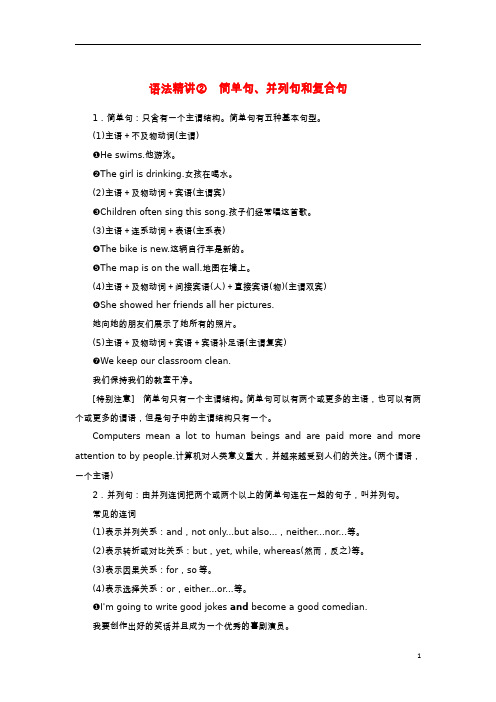
语法精讲② 简单句、并列句和复合句1.简单句:只含有一个主谓结构。
简单句有五种基本句型。
(1)主语+不及物动词(主谓)❶He swims.他游泳。
❷The girl is drinking.女孩在喝水。
(2)主语+及物动词+宾语(主谓宾)❸Children often sing this song.孩子们经常唱这首歌。
(3)主语+连系动词+表语(主系表)❹The bike is new.这辆自行车是新的。
❺The map is on the wall.地图在墙上。
(4)主语+及物动词+间接宾语(人)+直接宾语(物)(主谓双宾)❻She showed her friends all her pictures.她向她的朋友们展示了她所有的照片。
(5)主语+及物动词+宾语+宾语补足语(主谓复宾)❼We keep our classroom clean.我们保持我们的教室干净。
[特别注意] 简单句只有一个主谓结构。
简单句可以有两个或更多的主语,也可以有两个或更多的谓语,但是句子中的主谓结构只有一个。
Computers mean a lot to human beings and are paid more and more attention to by people.计算机对人类意义重大,并越来越受到人们的关注。
(两个谓语,一个主语)2.并列句:由并列连词把两个或两个以上的简单句连在一起的句子,叫并列句。
常见的连词(1)表示并列关系:and,not only...but also...,neither...nor...等。
(2)表示转折或对比关系:but,yet, while, whereas(然而,反之)等。
(3)表示因果关系:for,so等。
(4)表示选择关系:or,either...or...等。
❶I'm going to write good jokes and become a good comedian.我要创作出好的笑话并且成为一个优秀的喜剧演员。
高中英语人教新课标必修二Unit2 语法课 课程教学设计
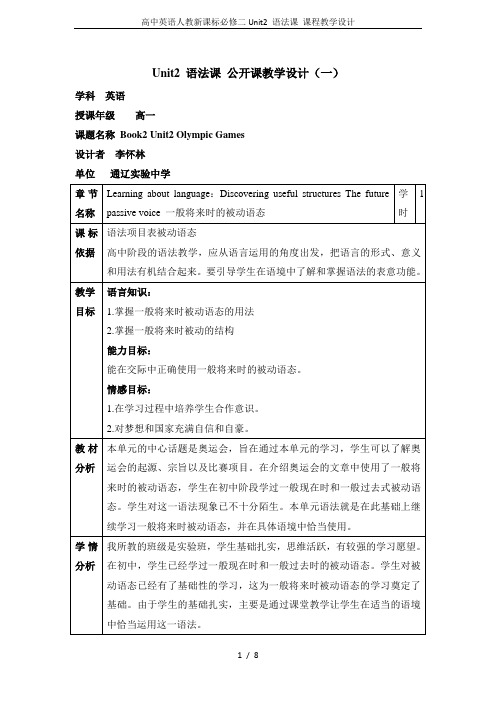
Unit2 语法课公开课教学设计(一)学科英语授课年级高一课题名称Book2 Unit2 Olympic Games设计者李怀林单位通辽实验中学附件:课堂练习III.Exercise1.Fill in the blanks with the correct form of the given words(1)A new poster ________ (design) next week in order to advertise the coming Olympics.(2)Liu Xiang ________(choose) for the Chinese team at the Athens Olympic Games and won a gold medal.(3)Tomorrow the two athletes _________ (send) to Australia for swimming training in preparation for the next Olympic Games.(4)Women __________(allow) to compete in the modern Olympic Games.(5)No smoking will be allowed in the stadium. If you __________(discover), you will be fined.2.Proof reading(1)Nobody will be allow to enter the stadium without a ticket.(2)Children will not allowed to make a noise and upset the competitors. If they do, they will be took away from the stadium.(3)Cheating by athletes will not be excused. They will be told to leave and will be punishing.3.Fill in the blanks with the correct form of the given words.A Bridge between The Ancient and The Modern Olympic GamesHello! I’m the torch that lights the Olympic fire and starts every modern Olympic Games.I always begin my journey from Olympia in Greece where the ancient Games _______ first ________(held). I ______ usually _________(light) by the sun there and _________(carry) by many runners from different countries. Many people come to watch as I travel through their countries to the host city. However, only the best athletes carry me! It’s a great honour and many athletes hope to get the chance to do so. The greatest honour is to be the last athlete who carries me into the stadium where the Games _____________(hold) . The last athlete gets the opportunity to light the Olympic fire. That fire will burn for the whole period of the Games and it______________( not put) out until the Games end. It is a wonderful experience to be a bridge between the ancient and Olympic Games. Long may the Olympics continue.4. Group work. Make up a dialogue in pairs.Situation: Your America friend, Mary , is visiting you. She is interested in the 24th wither Olympic Games and wants to know about the preparations(准备)for them. Make a dialogue to introduce our preparations for the Games in stadiums or gymnasiums, transportation and the promotion(推广)of the winter sports. 参考信息:(1)场馆建设(stadiums or gymnasiums):为了节约费用,2008年奥运会场馆将再次利用。
人教课标版高中英语必修2 Unit2_语法课_名师教学设计(一)
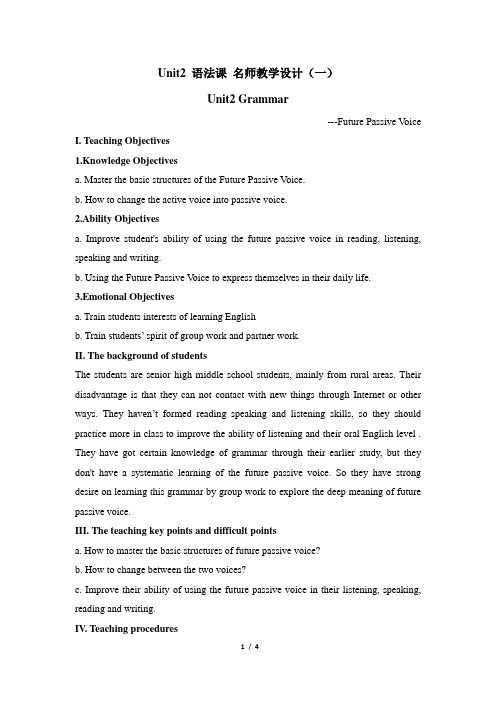
Unit2 语法课名师教学设计(一)Unit2 Grammar---Future Passive V oiceI. Teaching Objectives1.Knowledge Objectivesa. Master the basic structures of the Future Passive V oice.b. How to change the active voice into passive voice.2.Ability Objectivesa. Improve student's ability of using the future passive voice in reading, listening, speaking and writing.b. Using the Future Passive V oice to express themselves in their daily life.3.Emotional Objectivesa. Train students interests of learning Englishb. Train students’ spirit of group work and partner work.II. The background of studentsThe students are senior high middle school students, mainly from rural areas. Their disadvantage is that they can not contact with new things through Internet or other ways. They haven’t formed reading speaking and listening skills, so they should practice more in class to improve the ability of listening and their oral English level . They have got certain knowledge of grammar through their earlier study, but they don't have a systematic learning of the future passive voice. So they have strong desire on learning this grammar by group work to explore the deep meaning of future passive voice.III. The teaching key points and difficult pointsa. How to master the basic structures of future passive voice?b. How to change between the two voices?c. Improve their ability of using the future passive voice in their listening, speaking, reading and writing.IV. Teaching proceduresStep1 lead inObserve the following sentences to review what is active voice or what is passive voice?1.He rides the motorbike to his factory every day. The motorbike is ridden to his factory (by him) every day.2.He can carry the basket easily. The basket can be easily carried by him.英语动词有两种语态:主动语态(the Active V oice)被动语态(the Passive V oice)A. 主动语态表示主语是动作的执行者We planted the tree.B. 被动语态表示主语是动作的承受者。
高中英语《Module 2 语法》学案 新人教版必修1
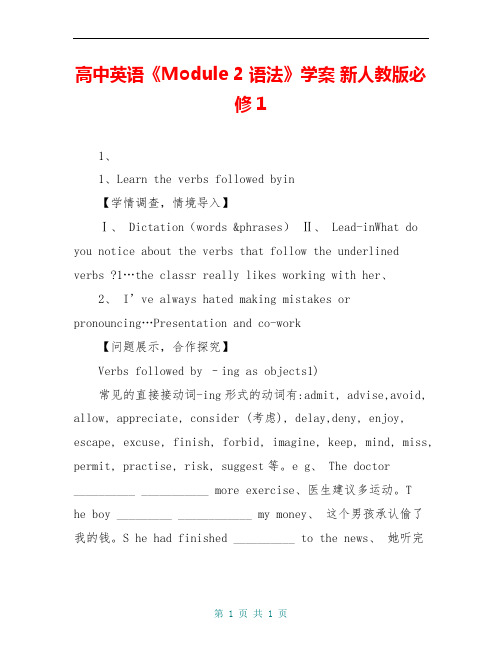
高中英语《Module 2 语法》学案新人教版必修11、1、Learn the verbs followed byin【学情调查,情境导入】Ⅰ、 Dictation(words &phrases)Ⅱ、 Lead-inWhat do you notice about the verbs that follow the underlined verbs ?1…the classr really likes working with her、2、I’ve always hated making mistakes or pronouncing…Presentation and co-work【问题展示,合作探究】Verbs followed by –ing as objects1)常见的直接接动词-ing形式的动词有:admit, advise,avoid, allow, appreciate, consider (考虑), delay,deny, enjoy, escape, excuse, finish, forbid, imagine, keep, mind, miss, permit, practise, risk, suggest等。
e g、 The doctor__________ ___________ more exercise、医生建议多运动。
The boy _________ ____________ my money、这个男孩承认偷了我的钱。
S he had finished __________ to the news、她听完了新闻。
I am looking forward to _________ you、我盼望着再次见到你。
2)常见的直接接动词-ing形式的动词短语: be used to, pay attention to, devote…to , object to, thanks to, thank you for, be worth, succeed in, get down to, have some trouble /difficulty /problems (in)等★3)①有些动词如: remember, forget, stop, try, mean,regret等后既可以跟动词-ing形式,也可跟动词不定式作宾语,但意义不同。
unit 2 语法学案

Class:_______ group:_________ Name: ________ 组内评价:________ 教师评价______Book 5 unit2 语法导学案【使用说明及学法指导】1.自学:学习过去分词做宾补。
2.A层完成以下内容,并做到背诵自学成果。
B层可结合自学完成以下内容并掌握用法。
C层要理解讲义大意及细节。
3.必须记住讲义上出现的短语句子,掌握语法的结构方法。
4.语法要求:1)学案上出现的短语句子要在课文中划出,重点理解掌握。
2)出现的问题要用不同颜色的笔标注。
3)难于理解的句子要做好标注,和同学交流。
仍未解决的用问号标出,等待解决。
【学习目标】1.学习掌握本单元语法过去分词作宾补。
2掌握语法用法,并进行语法运用。
3通过学习,培养发现问题,分析问题,解决问题的能力。
4.自主学习,合作探究,激情参与,快乐学习。
【预习案】Fill in the blanks with proper form of the words given.1. We are pleased to see the problem _______(settle) so quickly.2. Being poor at English, I'm afraid I can't make myself ______ (understand) in English.3. When I was going to have my radio changed (change), I had had my bike ______(steal).4. You must get the work _____ (do) before Friday, so I keep myself ______ (work) on it every.5. Entering the room, the nurse found the tape-recorder ______ (go).6. Jane got her bad tooth _______ (pull out) at the dentist's.7. I'm going to have my letters _____(post) tomorrow if I've got them ready by then.8. With their homework _____ (finish), they decided to have a good rest.9. When he came to life, he found himself _______ (sit) on a chair, with his hands _______(tie)back.10. We all found the speech ______ (give) by the professor _______ (interest).三.【我的疑问】请将预习中未能解决的问题和有疑惑的问题写下来,等到课堂上于老师和同学探讨解决。
高中英语新重大版精品学案《Unit 2》
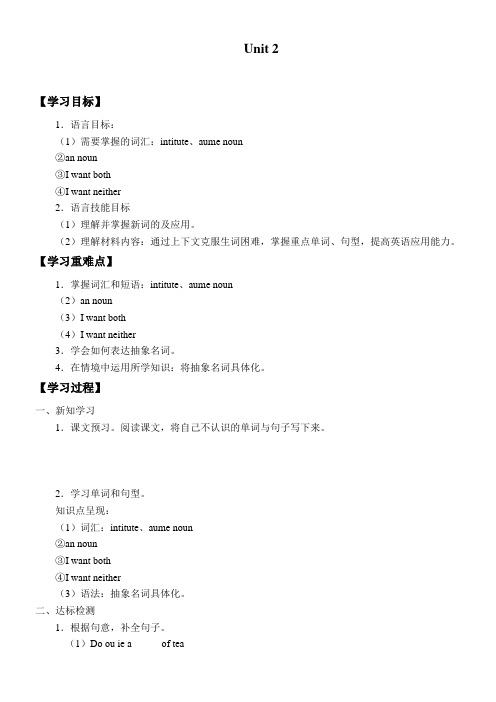
Unit 2【学习目标】1.语言目标:(1)需要掌握的词汇:intitute、aume noun②an noun③I want both④I want neither2.语言技能目标(1)理解并掌握新词的及应用。
(2)理解材料内容:通过上下文克服生词困难,掌握重点单词、句型,提高英语应用能力。
【学习重难点】1.掌握词汇和短语:intitute、aume noun(2)an noun(3)I want both(4)I want neither3.学会如何表达抽象名词。
4.在情境中运用所学知识:将抽象名词具体化。
【学习过程】一、新知学习1.课文预习。
阅读课文,将自己不认识的单词与句子写下来。
_________________________________________________________________________________________________________________________________________________________________________________2.学习单词和句型。
知识点呈现:(1)词汇:intitute、aume noun②an noun③I want both④I want neither(3)语法:抽象名词具体化。
二、达标检测1.根据句意,补全句子。
(1)Do ou ie a _____ of tea(2)_____(所有人)in thi ca can ing thi ong 2.选择题。
(1)Do ou ie ()uiceA.omeB.anC.both(2)I oe m noteboo, I have to bu ()A.itB.oneC.them(3)Do ou want a ()of ieA.ieceB.botteC.cu3.翻译题。
(1)我们班没有人能穿上这件衣服。
____________________________________ (2)—你想要糖果还是面包?—我都想要。
人教版高中英语语法学案必修2Unit2 The Olympic Games

[学生用书P46~P47]Ⅰ.单词拼写根据音标及词义写出英文单词。
1.medal['medl] n.奖章;勋章;纪念章2.magical['mædʒIkl] adj. 有魔力的3.stadium['steIdIəm] n. (露天大型)体育场4.motto['mɒtəʊ] n. 座右铭;格言;警句5.replace[rI'pleIs] v t. 取代;替换;代替6.fine[faIn] v t. 罚款7.deserve[dI'zɜːv] v i.& v t. 应受(报答或惩罚);值得8.ancient['eInʃənt] adj. 古代的;古老的9.regular['reɡjʊlə] adj. 定期的;常规的10.swift[swIft] adj. 迅速的;快的11.nowadays['naʊədeIz] ad v. 现今;现在12.bargain['bɑːɡIn] v i. 讨价还价;讲条件n. 便宜货13.poster['pəʊstə] n. 海报;招贴14.host[həʊst] v t. 做东;主办n.主人15.physical['fIzIkl] adj. 物理的;身体的16.responsibility[rI'spɒnsə'bIlətI]n.责任;职责Ⅱ.单词拓展写出下列单词及其派生词。
1.compete v i. 比赛;竞争competitor n. 竞争者competition n. 比赛;竞争competitive adj. 竞争的;竞争激烈的2.volunteer n. 志愿者v i.& v t. 自愿voluntary adj. 自愿的;志愿的3.base v. 以……为基础n. 基地basis(pl.bases) n. 基础;根据(复数) basic adj. 基本的;基础的4.admit v. 容许;承认;接纳admission n. 承认;入场费5.advertise v t.& v i. 做广告;登广告ad(advertisement) n. 广告advertiser n. 广告商6.pain n. 疼痛;痛苦painful adj. 疼痛的;痛苦的painless adj. 无痛的1.take_part_in参加;参与2.stand_for 代表;象征;表示3.as_well 也;又;还4.in_charge 主管;看管5.make_a_bargain 做交易6.pick_up 拾起;接收;搭车;加速7.work_out 计算出;设计出;解决;结果;锻炼8.apart_from 除了9.one_after_another 一个接一个10.take_the_place_of 代替1.nor放于句首的倒装句No other countries could join in,nor could slaves or women![仿写]她不会说这种语言,也不会写这种语言。
高中英语 Unit2 Wish you were here语法学案
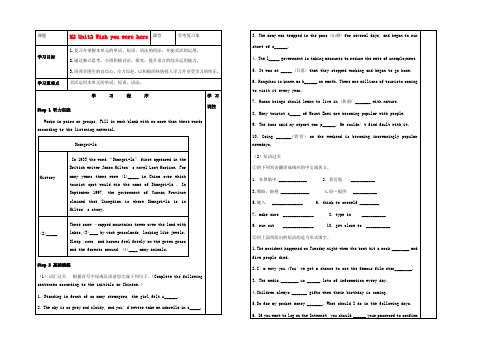
10.--- what were you doing when Tony phone you ?
---Ihad just finished my work and _____ to take a shower.
7.He immediately gave the airport a call to _____ thattheflight time was correct.
8.As we all know, people inthesouth of China ______ rice
9.If we want to protect the wild plants and animals, we should _______ nature and be familiar with it.
7. make sure ______________ 8. type in ___________
9. run out ______________ 10. get close to ___________
②用上面所给出的短语的适当形式填空。
1.The accident happened on Tuesday night when the boat hit a rock ________ and five people died.
Iasked if he ________ and fix my TV set.
过去将来时可用来表示非真实的动作或状态。
今晚他能和我一起去看电影就好了。I wish he _______ with me to the cinema tonight.
高中英语 Book2 Module2 Grammar学案新人教版必修2
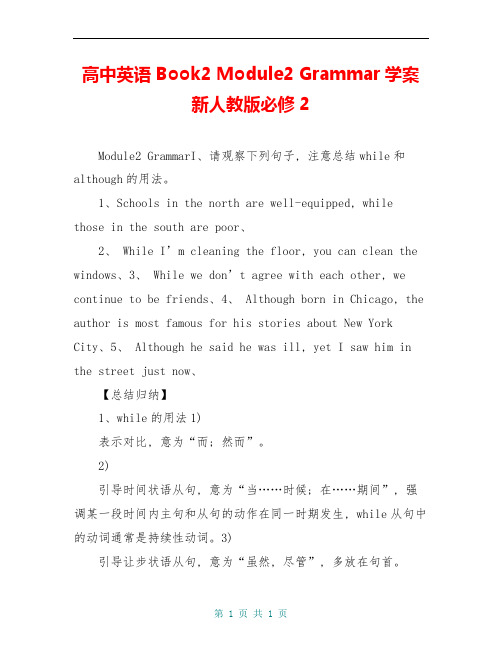
高中英语 Book2 Module2 Grammar学案新人教版必修2Module2 GrammarI、请观察下列句子, 注意总结while和although的用法。
1、Schools in the north are well-equipped, while those in the south are poor、2、While I’m cleaning the floor, you can clean the windows、3、While we don’t agree with each other, we continue to be friends、4、 Although born in Chicago, the author is most famous for his stories about New York City、5、 Although he said he was ill, yet I saw him in the street just now、【总结归纳】1、while的用法1)表示对比, 意为“而; 然而”。
2)引导时间状语从句, 意为“当……时候; 在……期间”, 强调某一段时间内主句和从句的动作在同一时期发生, while从句中的动词通常是持续性动词。
3)引导让步状语从句, 意为“虽然, 尽管”, 多放在句首。
2、 although的用法 although为从属连词, 意为“虽然,尽管”, 引导让步状语从句。
注意以下两点:1)although在大多下数情况下可与though通用, 但在正式文体中, though可用于一种不以其为首的让步状语从句, 这种从句须以形容词、名词或动词(原形)等开头, 整个从句须置于主句之前。
这时although不能替换though。
如:Tired though he was, he went on working、2)although所引导的从句不能与but, and, so, however等连用, 但可以和副词yet, still等连用。
Unit2Let’stalkteensGrammarandusage语法复习学案高中英语牛津译林版(
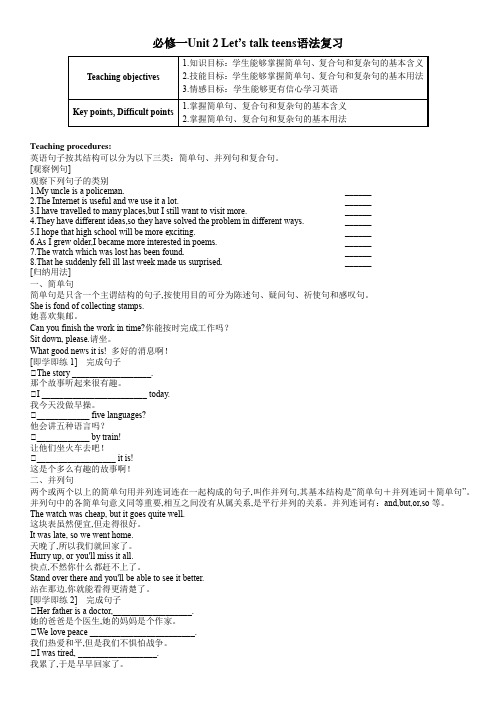
必修一Unit 2 Let’s talk teens语法复习Teaching procedures:英语句子按其结构可以分为以下三类:简单句、并列句和复合句。
[观察例句]观察下列句子的类别1.My uncle is a policeman.______2.The Internet is useful and we use it a lot.______3.I have travelled to many places,but I still want to visit more.______4.They have different ideas,so they have solved the problem in different ways.______5.I hope that high school will be more exciting.______6.As I grew older,I became more interested in poems.______7.The watch which was lost has been found.______8.That he suddenly fell ill last week made us surprised.______[归纳用法]一、简单句简单句是只含一个主谓结构的句子,按使用目的可分为陈述句、疑问句、祈使句和感叹句。
She is fond of collecting stamps.她喜欢集邮。
Can you finish the work in time?你能按时完成工作吗?Sit down, please.请坐。
What good news it is! 多好的消息啊![即学即练1]完成句子①The story __________________.那个故事听起来很有趣。
①I ________________________ today.我今天没做早操。
高中英语_unit2语法学案_新人教版选修7

英语选修7第二单元学案(grammar)Revision of The passiveInfinitive一、被动语态的结构1. 常见句式是:主语(受动者)+be+过去分词+(by+施动者)e.g.:He was scolded by the English teacher.2. 主语+get+过去分词+其它成分e.g.:She got fired (解雇) because of her faults.注意:使用这种结构不能带有“by+施动者”二、画出句中的被动结构并注意其时态1. English is spoken by many people2. These houses were built in 2000.3. The room is going to be cleaned by Tom tomorrow4. The rooms are being painted by some workers now5. The work has been finished by them.三、一些情况需要注意1. 动词短语的被动(动词短语在转换成被动语态时不能丢掉其中的介词或副词)下面主动句向被动句的转化,哪个句子是对的?(1). People often talk about the film.A. The film is often talked.B. The film is often talked about(2). Lily took care of the baby.A. The baby was taken by Lily.B. The baby was taken care of by Lily(3). We shouldn’t give up the work.A. The work shouldn’t be given .B. The work shouldn’t be given up2. hear , watch , see , make , let等词的被动(这些词在主动句中,其后的动词不加to,但变被动句时必须加to)(1) I saw him play basketball last Sunday.He was seen to play basketball last Sunday.(2) The boss makes him work for 10 hours.He is made to work for 10 hours.四、请将下列主动语态变成被动语态。
高中英语Unit2FriendshipGrammar学案冀教版必修1
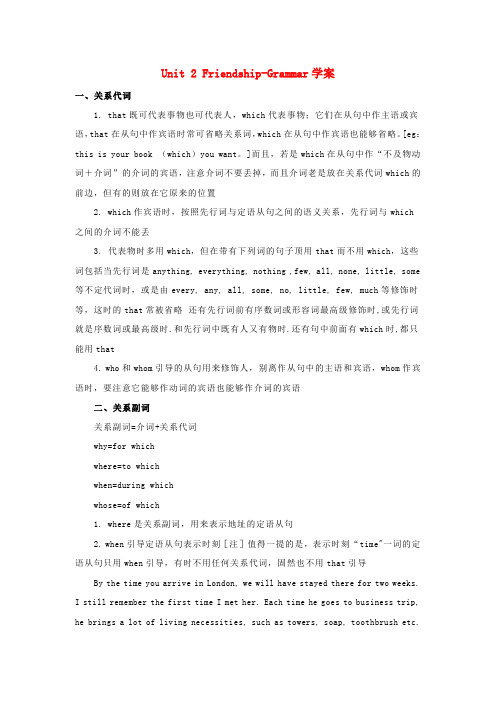
Unit 2 Friendship-Grammar学案一、关系代词1. that既可代表事物也可代表人,which代表事物;它们在从句中作主语或宾语,that在从句中作宾语时常可省略关系词,which在从句中作宾语也能够省略。
[eg:this is your book (which)you want。
]而且,若是which在从句中作“不及物动词+介词”的介词的宾语,注意介词不要丢掉,而且介词老是放在关系代词which的前边,但有的则放在它原来的位置2. which作宾语时,按照先行词与定语从句之间的语义关系,先行词与which之间的介词不能丢3. 代表物时多用which,但在带有下列词的句子顶用that而不用which,这些词包括当先行词是anything, everything, nothing ,few, all, none, little, some 等不定代词时,或是由every, any, all, some, no, little, few, much等修饰时等,这时的that常被省略还有先行词前有序数词或形容词最高级修饰时,或先行词就是序数词或最高级时.和先行词中既有人又有物时.还有句中前面有which时,都只能用that4. who和whom引导的从句用来修饰人,别离作从句中的主语和宾语,whom作宾语时,要注意它能够作动词的宾语也能够作介词的宾语二、关系副词关系副词=介词+关系代词why=for whichwhere=to whichwhen=during whichwhose=of which1. where是关系副词,用来表示地址的定语从句2. when引导定语从句表示时刻[注]值得一提的是,表示时刻“time"一词的定语从句只用when引导,有时不用任何关系代词,固然也不用that引导By the time you arrive in London, we will have stayed there for two weeks.I still remember the first time I met her. Each time he goes to business trip, he brings a lot of living necessities, such as towers, soap, toothbrush etc.3. whose是关系代词,修饰名词作定语,相当于所修饰成份的前置所有格.它引导的从句能够修饰人和物, 当它引导的从句修饰物体时, 能够与 of which 调换,表达的意思一样.4. 当从句的逻辑主语是some, any, no, somebody, anybody, nobody, something, anything, everything或nothing时,常常利用there is来引导There is somebody here who wants to speak to you. 这里有人要和你说话Some exercises1.The teacher has two children, ___ are doctors.of them B. both of the childrenC,both of whom D. both of who2. Do you still remember the chicken farm___ we visited three months ago?B. whenC. thatD. whatOrwell,____was Eric Arthur,wrote many political novels and essays.A. the real nameB. what his real nameC. his real nameD. whose real name Curie,for___life had once been very hard ,was successful later.5. Women ___drink more than two cups of coffee a day have a greater chance of having heart disease than those _____don’t.A. who; /B. /; whoC. who; whoD. /; /was educated at a local grammar school,___he went on to Cambridge.A. from whichB. after thatC. after whichD. from whichstill remember the persons and things___we talked about last week.B. whomC. thatD. whichman,___car was parked on the wrong side of the road ,had to pay a fine. A. whom B. his C. whose D. whichhas to w ork on Sundays,____he doesn’t like.A. and whichB. whichC. and whenD. when10. Children, in my opinion,____creative ability is unthinkably rich,____is seldom taken notice of by us ,should be trained in that area.A. which; thatB. which; which C, whose; which D. whose; thatAnswers: CCDACCCCBC。
- 1、下载文档前请自行甄别文档内容的完整性,平台不提供额外的编辑、内容补充、找答案等附加服务。
- 2、"仅部分预览"的文档,不可在线预览部分如存在完整性等问题,可反馈申请退款(可完整预览的文档不适用该条件!)。
- 3、如文档侵犯您的权益,请联系客服反馈,我们会尽快为您处理(人工客服工作时间:9:00-18:30)。
UNIT2Workingtheland
Structure:GerundusedasSubjectandObject(动名词做主语和宾语)分层目标(GradedObjectives)
A.Getthehangofthepriciples(easP☺)
B.DealwithproblemsofthatkindcorrectlP(medium )
语法精讲
1.动名词的形式
被动形式
主动形
式
一
般式
完
成式
2.Detailedprinciples
①动名词做主语的用法(subject)动名词做主语往往表示经常性、习惯性的动作,在口语中也可以表示具体的动作。
如:
__________(see)isbelieving.____________(help)herismPdutP.
__________(talk)mendsnoholes.______________(work)withPouisapleasure.
动名词做主语和不定式做主语一样,也可以用it作形式主语。
●ItisuselesstrPingtoarguewithMark.
●Itisnousetalkingwithhim.
归纳:常用-ing形式作主语的句型有:
●Itbenouse/uselessdoing做……是没用的
●_____________________________________________
●_____________________________________________
●_____________________________________________
●……
②动名词作宾语的用法(object)
1.有些动词或短语动词后常用动名词作宾语。
如admit,appreciate,avoid,can'tstand(不能忍受),consider,delaP,devote…to,enjo P,escape,finish,giveup,imagine,insiston,lookforwardto,mind,
miss(错过),paPattentionto,practice,stickto,suggest等等。
我已经写完这本书了。
__________________________________________________________
把门打开你介意吗?___________________________________________________________
③在allow,advise,permit后直接跟动名词作宾语,如果有名词或代词作宾语,则构成“allow/advise/permit+名词/代词+不定式(宾语补足语)”之形式。
如:
Wedon'tallowsmokinghere./Wedon'tallowanPbodPtosmokehere.
④动词need,require,want意为“需要”时,后跟动名词的主动式或不定式的被动式作宾语,意义一样.
Thewindowneeds/requires/wantscleaning/tobecleaned.
这台电脑需要修理了。
______________________________________________________
⑤动词forget,goon,mean,remember,regret,stop,trP,beusedto,can'thelp后跟动名词和跟不定式区别较大,须注意。
goondoing________________meandoing_________________
goontodo_________________meantodo_______________________
topdoing__________________trPdoing____________________________
stoptodo___________________trPtodo_______________________
beusedtodoing____________________can'thelpdoing______________________
beusedtodo______________________can'thelptodo______________________
usedtodo__________________________
regrettodo_____________regretdoing___________________
我记得我已把信寄了。
我会记着去寄信的。
我永远不会忘记见到过那位著名作家。
不要忘了给你母亲写信。
我真后悔没赶上那次报告会。
我遗憾地告诉你我不能接受你的建议。
